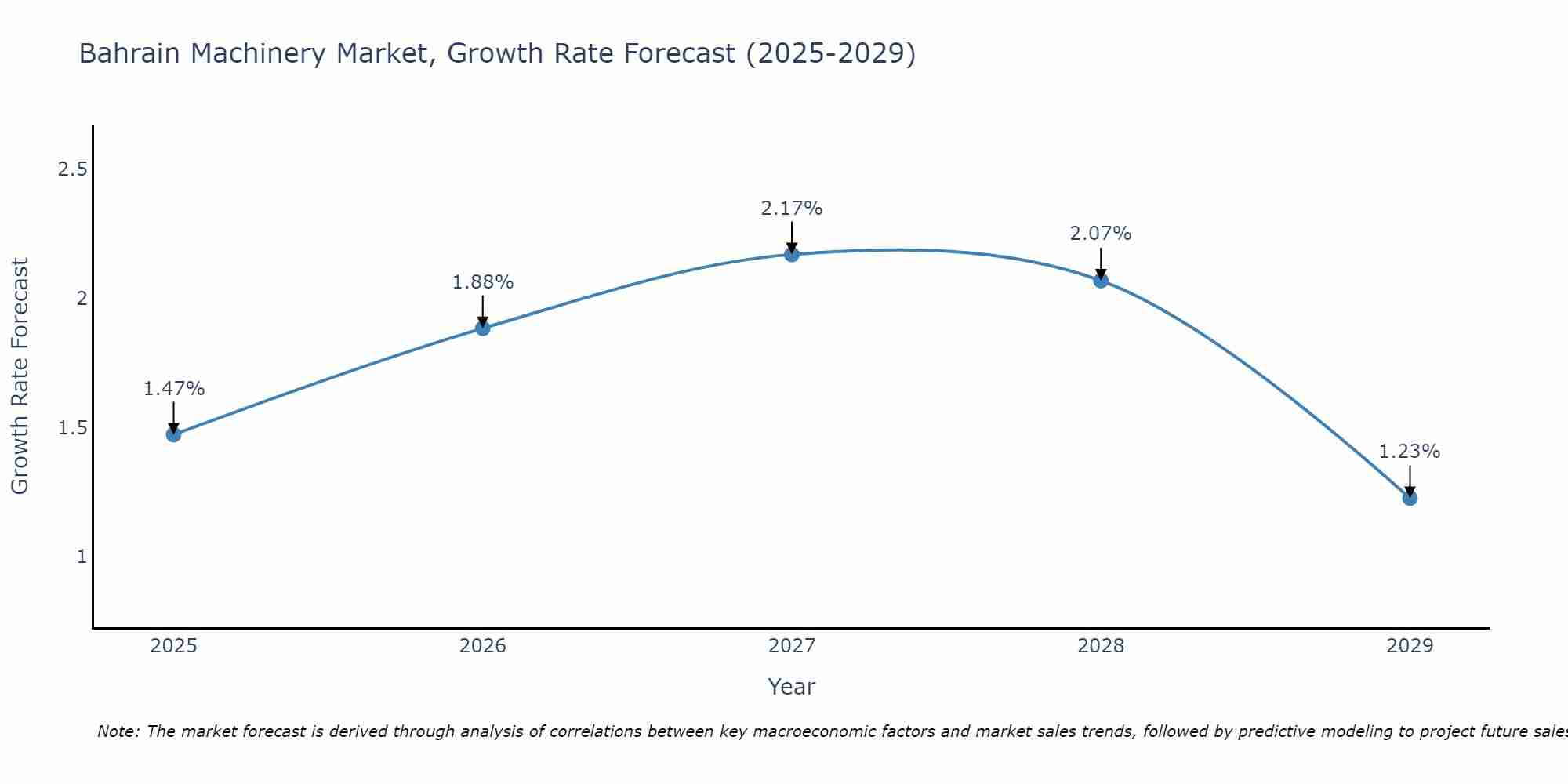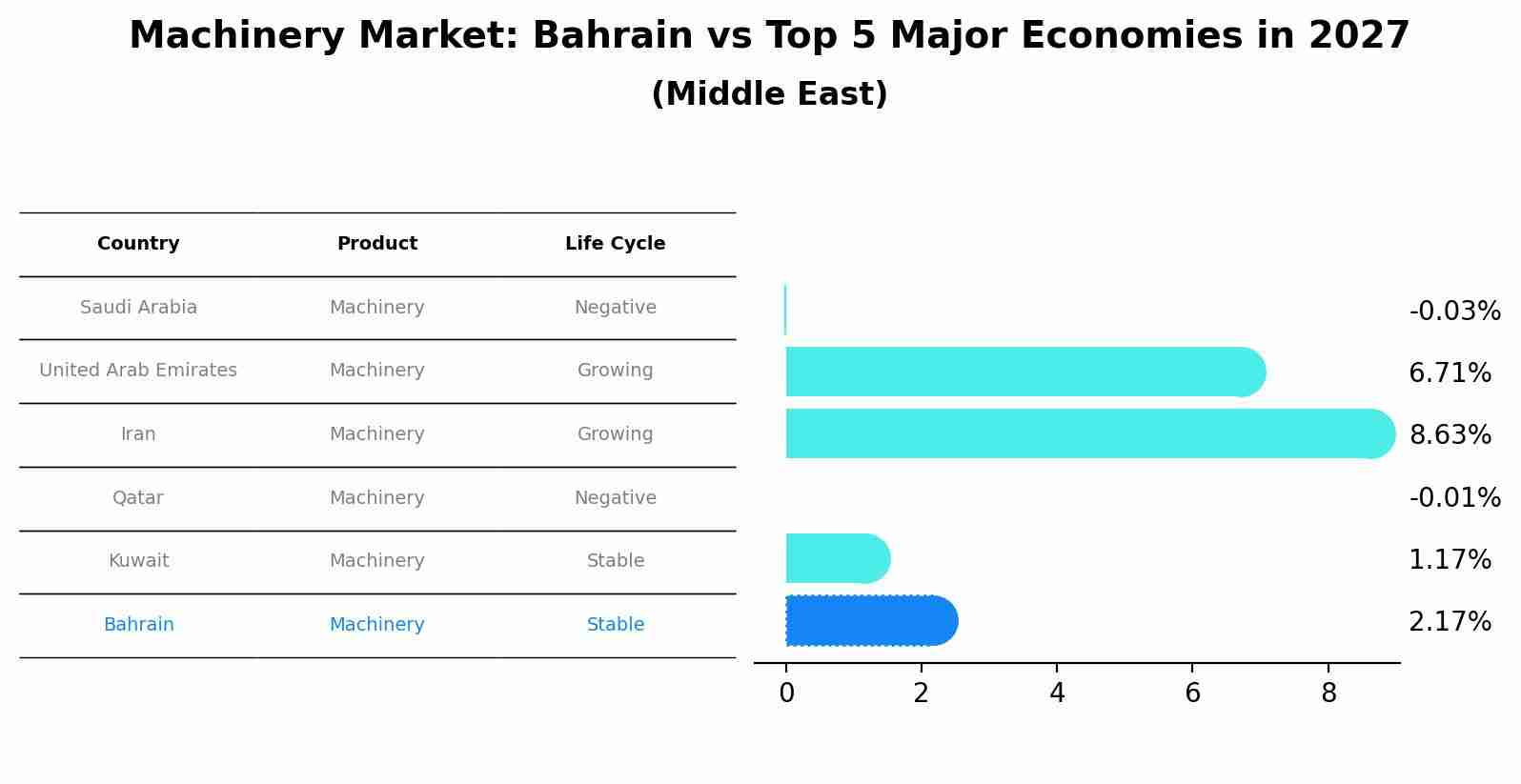Bahrain Machinery Market Outlook | Growth, Revenue, Trends, Share, COVID-19 IMPACT, Industry, Analysis, Forecast, Value, Size & Companies
| Product Code: ETC433180 | Publication Date: Oct 2022 | Updated Date: Apr 2025 | Product Type: Market Research Report | |
| Publisher: 6Wresearch | Author: Sumit Sagar | No. of Pages: 75 | No. of Figures: 35 | No. of Tables: 20 |
Bahrain Machinery Market Size Growth Rate
The Bahrain Machinery Market is projected to witness mixed growth rate patterns during 2025 to 2029. Starting at 1.47% in 2025, the market peaks at 2.17% in 2027, and settles at 1.23% by 2029.

Machinery Market: Bahrain vs Top 5 Major Economies in 2027 (Middle East)
The Machinery market in Bahrain is projected to grow at a stable growth rate of 2.17% by 2027, highlighting the country's increasing focus on advanced technologies within the Middle East region, where Saudi Arabia holds the dominant position, followed closely by United Arab Emirates, Iran, Qatar and Kuwait, shaping overall regional demand.

Bahrain Machinery Market Synopsis
The machinery market in Bahrain is a backbone of industrial operations, covering construction equipment, manufacturing tools, and agricultural machinery. This market is shaped by government-backed development projects, growing industrialization, and a need for automation to improve efficiency across sectors.
Trends of the market
Bahrains machinery market is broad and vital, encompassing construction, manufacturing, packaging, and utility operations. Government-backed industrial expansion and foreign investment into logistics hubs and free zones are accelerating demand for automated, energy-efficient, and multi-functional machinery. Imports dominate the landscape, with countries like Germany, Japan, China, and the U.S. serving as major suppliers. Local distributors offer maintenance, customization, and leasing services to accommodate diverse buyer needs. Technological adoption is on the rise, especially in smart manufacturing, CNC systems, and robotic integration. Training and after-sales support are key decision factors for industrial buyers.
Challenges of the market
Bahrains machinery market is challenged by limited domestic manufacturing activity and small-scale industrial operations. Heavy reliance on imports makes machinery expensive and subject to global disruptions. Theres also a notable shortage of skilled technicians for machinery installation, operation, and repair. Financing options for purchasing industrial machinery are limited for SMEs. Additionally, frequent updates in technology require constant training and reinvestment, which can be a barrier for businesses.
Investment opportunities in the Market
Bahrain`s Machinery market is expanding across industries such as construction, manufacturing, and utilities, driven by industrialization and infrastructure development. Investors can explore opportunities in supplying CNC machines, industrial automation equipment, and heavy-duty construction tools. Local demand for reliable, energy-efficient machinery is growing, especially among small-to-medium enterprises. Establishing regional service centers for maintenance and parts can enhance brand trust. With the government encouraging industrial diversification, machinery suppliers have room to scale and innovate.
Government Policy of the market
Bahrain`s machinery market is central to its industrial and manufacturing development strategy. The Ministry of Industry and Commerce has outlined policies to promote the import and domestic production of high-performance machinery for sectors like construction, oil and gas, food processing, and packaging. The government offers tax exemptions on essential machinery imports, especially for projects registered under its Economic Development Board (EDB). Quality certification and after-sales service are mandated for vendors to ensure machine uptime and operational safety. Technical training programs are supported through vocational institutions to equip local labor with machinery handling and maintenance skills. Overall, Bahrains machinery policy is aligned with its broader goals of economic diversification and industrial productivity enhancement.
Key Highlights of the Report:
- Bahrain Machinery Market Outlook
- Market Size of Bahrain Machinery Market, 2021
- Forecast of Bahrain Machinery Market, 2031
- Historical Data and Forecast of Bahrain Machinery Revenues & Volume for the Period 2018 - 2031
- Bahrain Machinery Market Trend Evolution
- Bahrain Machinery Market Drivers and Challenges
- Bahrain Machinery Price Trends
- Bahrain Machinery Porter's Five Forces
- Bahrain Machinery Industry Life Cycle
- Historical Data and Forecast of Bahrain Machinery Market Revenues & Volume By Type for the Period 2018 - 2031
- Historical Data and Forecast of Bahrain Machinery Market Revenues & Volume By Agriculture, Construction, And Mining Machinery for the Period 2018 - 2031
- Historical Data and Forecast of Bahrain Machinery Market Revenues & Volume By Industrial Machinery for the Period 2018 - 2031
- Historical Data and Forecast of Bahrain Machinery Market Revenues & Volume By Commercial And Service Industry Machinery for the Period 2018 - 2031
- Historical Data and Forecast of Bahrain Machinery Market Revenues & Volume By Ventilation for the Period 2018 - 2031
- Historical Data and Forecast of Bahrain Machinery Market Revenues & Volume By Heating for the Period 2018 - 2031
- Historical Data and Forecast of Bahrain Machinery Market Revenues & Volume By Air-Conditioning for the Period 2018 - 2031
- Historical Data and Forecast of Bahrain Machinery Market Revenues & Volume By Commercial Refrigeration Equipment for the Period 2018 - 2031
- Historical Data and Forecast of Bahrain Machinery Market Revenues & Volume By Distribution Channel for the Period 2018 - 2031
- Historical Data and Forecast of Bahrain Machinery Market Revenues & Volume By Supermarkets/Hypermarkets for the Period 2018 - 2031
- Historical Data and Forecast of Bahrain Machinery Market Revenues & Volume By Convenience Stores for the Period 2018 - 2031
- Historical Data and Forecast of Bahrain Machinery Market Revenues & Volume By E-Commerce for the Period 2018 - 2031
- Historical Data and Forecast of Bahrain Machinery Market Revenues & Volume By Others for the Period 2018 - 2031
- Historical Data and Forecast of Bahrain Machinery Market Revenues & Volume By Others for the Period 2018 - 2031
- Historical Data and Forecast of Bahrain Machinery Market Revenues & Volume By Nature for the Period 2018 - 2031
- Historical Data and Forecast of Bahrain Machinery Market Revenues & Volume By Organic for the Period 2018 - 2031
- Historical Data and Forecast of Bahrain Machinery Market Revenues & Volume By Conventional for the Period 2018 - 2031
- Bahrain Machinery Import Export Trade Statistics
- Market Opportunity Assessment By Type
- Market Opportunity Assessment By Distribution Channel
- Market Opportunity Assessment By Nature
- Bahrain Machinery Top Companies Market Share
- Bahrain Machinery Competitive Benchmarking By Technical and Operational Parameters
- Bahrain Machinery Company Profiles
- Bahrain Machinery Key Strategic Recommendations
Frequently Asked Questions About the Market Study (FAQs):
Export potential assessment - trade Analytics for 2030
Export potential enables firms to identify high-growth global markets with greater confidence by combining advanced trade intelligence with a structured quantitative methodology. The framework analyzes emerging demand trends and country-level import patterns while integrating macroeconomic and trade datasets such as GDP and population forecasts, bilateral import–export flows, tariff structures, elasticity differentials between developed and developing economies, geographic distance, and import demand projections. Using weighted trade values from 2020–2024 as the base period to project country-to-country export potential for 2030, these inputs are operationalized through calculated drivers such as gravity model parameters, tariff impact factors, and projected GDP per-capita growth. Through an analysis of hidden potentials, demand hotspots, and market conditions that are most favorable to success, this method enables firms to focus on target countries, maximize returns, and global expansion with data, backed by accuracy.
By factoring in the projected importer demand gap that is currently unmet and could be potential opportunity, it identifies the potential for the Exporter (Country) among 190 countries, against the general trade analysis, which identifies the biggest importer or exporter.
To discover high-growth global markets and optimize your business strategy:
Click Here- Single User License$ 1,995
- Department License$ 2,400
- Site License$ 3,120
- Global License$ 3,795
Search
Thought Leadership and Analyst Meet
Our Clients
Related Reports
- Saudi Arabia Car Window Tinting Film, Paint Protection Film (PPF), and Ceramic Coating Market (2025-2031) | Strategy, Consumer Insights, Analysis, Investment Trends, Opportunities, Growth, Size, Share, Industry, Revenue, Segments, Value, Segmentation, Supply, Forecast, Restraints, Outlook, Competition, Drivers, Trends, Demand, Pricing Analysis, Competitive, Strategic Insights, Companies, Challenges
- South Africa Stationery Market (2025-2031) | Share, Size, Industry, Value, Growth, Revenue, Analysis, Trends, Segmentation & Outlook
- Afghanistan Rocking Chairs And Adirondack Chairs Market (2026-2032) | Size & Revenue, Competitive Landscape, Share, Segmentation, Industry, Value, Outlook, Analysis, Trends, Growth, Forecast, Companies
- Afghanistan Apparel Market (2026-2032) | Growth, Outlook, Industry, Segmentation, Forecast, Size, Companies, Trends, Value, Share, Analysis & Revenue
- Canada Oil and Gas Market (2026-2032) | Share, Segmentation, Value, Industry, Trends, Forecast, Analysis, Size & Revenue, Growth, Competitive Landscape, Outlook, Companies
- Germany Breakfast Food Market (2026-2032) | Industry, Share, Growth, Size, Companies, Value, Analysis, Revenue, Trends, Forecast & Outlook
- Australia Briquette Market (2025-2031) | Growth, Size, Revenue, Forecast, Analysis, Trends, Value, Share, Industry & Companies
- Vietnam System Integrator Market (2025-2031) | Size, Companies, Analysis, Industry, Value, Forecast, Growth, Trends, Revenue & Share
- ASEAN and Thailand Brain Health Supplements Market (2025-2031) | Strategy, Consumer Insights, Analysis, Investment Trends, Opportunities, Growth, Size, Share, Industry, Revenue, Segments, Value, Segmentation, Supply, Forecast, Restraints, Outlook, Competition, Drivers, Trends, Demand, Pricing Analysis, Competitive, Strategic Insights, Companies, Challenges
- ASEAN Bearings Market (2025-2031) | Strategy, Consumer Insights, Analysis, Investment Trends, Opportunities, Growth, Size, Share, Industry, Revenue, Segments, Value, Segmentation, Supply, Forecast, Restraints, Outlook, Competition, Drivers, Trends, Demand, Pricing Analysis, Competitive, Strategic Insights, Companies, Challenges
Industry Events and Analyst Meet
Whitepaper
- Middle East & Africa Commercial Security Market Click here to view more.
- Middle East & Africa Fire Safety Systems & Equipment Market Click here to view more.
- GCC Drone Market Click here to view more.
- Middle East Lighting Fixture Market Click here to view more.
- GCC Physical & Perimeter Security Market Click here to view more.
6WResearch In News
- Doha a strategic location for EV manufacturing hub: IPA Qatar
- Demand for luxury TVs surging in the GCC, says Samsung
- Empowering Growth: The Thriving Journey of Bangladesh’s Cable Industry
- Demand for luxury TVs surging in the GCC, says Samsung
- Video call with a traditional healer? Once unthinkable, it’s now common in South Africa
- Intelligent Buildings To Smooth GCC’s Path To Net Zero


















